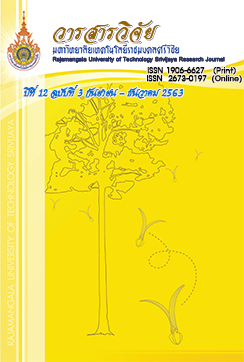Innovation in Electric Reinforcing for Household
Keywords:
air circulation system, smart hybrid power plant, innovation of electric reinforcingAbstract
The study of Innovation in Electric Reinforcing for Household aimed to: 1) study electrical energy consumption state of household, 2) develop innovation in electric reinforcing for household, and 3) study the effectiveness of using the innovation in electric reinforcing for household. The sample house is 69/1 Moo 11, Khanom sub-district, Khanom district, Nakhon Si Thammarat. The data were collected from the electrical energy meter for electrical appliances and statistics on the electrical energy consumption before using the innovation. Additionally, the effectiveness was compared between the statistical electrical energy consumption prior and after the innovation which were in year 2012 and year 2016. The result of the study according to the objectives were as follows. 1) The electrical energy consumption state of household sample requires daily average usage of 13.9 kWh of electrical energy consumption, and the statistical electrical energy consumption in 2012 is 19,386.9 baht. 2) The Innovation in Electric Reinforcing for Household is consisted of the use of LEDs instead of fluorescent tubes, the use of air circulation instead of air conditioning, and the development of Smart Hybrid power plant producing 3,000 watts from solar cells. 3) The effectiveness of the Innovation in Electric Reinforcing for Household is estimated from the electricity cost in 2016, which is 1,544.6 baht. The electricity cost is 91.9% less than the regular costs, and the payback period is 7 years.
References
กลุ่มอุตสาหกรรมพลังงานทดแทน. 2558. การดำเนินการด้านธุรกิจพลังงานทดแทน หลักสูตพลังงานสำหรับผู้บริหาร. เอกสารเผยแพร่, สภาอุตสาหกรรมแห่งประเทศไทย.
บริษัท เมเชอร์โทรนิกส์ จำกัด. 2559. เครื่องทดสอบและวิเคราะห์แบตเตอรี่ชนิด Deep Cycle. วารสาร Semiconductor Electronics (432): 43-51.
วรนุช แจ้งสว่าง. 2553. พลังงานหมุนเวียน (Renewable Energy). สำนักพิมพ์แห่งจุฬาลงกรณ์มหาวิทยาลัย, กรุงเทพฯ.
ศูนย์เทคโนโลยีสารสนเทศและการสื่อสาร. 2562. สถานการณ์การใช้น้ำมันและไฟฟ้า ในช่วง 2 เดือนแรกของปี 2562. สถานการณ์การใช้น้ำมันและไฟฟ้า. แหล่งที่มา: http://www.eppo.go.th/index.php/th/energy-information/situation -oil-electric?orders[publishUp]=publishUp& issearch=1, 29 พฤษภาคม 2562.
ศูนย์ภูมิอากาศ สำนักพัฒนาอุตุนิยมวิทยา กรมอุตุนิยมวิทยา. 2560. ภูมิอากาศจังหวัดนครศรีธรรมราช. แหล่งที่มา: http://climate.tmd.go.th/data/province/ใต้ฝั่งตะวันออก/ภูมิอากาศนครศรีธรรมราช.pdf, 20 พฤศจิกายน 2560.
สำนักงานนโยบายและแผนพลังงาน. 2561. คู่มือแผนพัฒนากำลังผลิตไฟฟ้าของประเทศไทย (Power Development Plan: PDP). เอกสารเผยแพร่, กระทรวงพลังงาน.
Frederiks, E.R., Stenner, K. and Hobman, E.V. 2015. Household energy use: Applying behavioural economics to understand consumer decision-making and behaviour. Renewable and Sustainable Energy Reviews 41: 1385-1394.
Hersch, P. and Zweibel, K. 1982. Basic Photovoltaic Principles and Methods. U.S. Government Printing Office, Washington DC.
Karthikeyan, V., Rajasekar, S., Das, V., Karuppanan, P. and Singh, A.K. 2017. Grid-Connected and Off-Grid Solar Photovoltaic System. Green Energy and Technology : 125-157.
Lan, L., Tsuzuki, K., Liu, Y.F. and Lian, Z.W. 2017. Thermal environment and sleep quality. Energy and Buildings 149: 101-113.
Seldon, Y., Penjor, U., Puri, K.R. and Lhendup, T. 2016. Performance Analysis of an Off-Grid and Grid-Tied Solar Photo Voltaic System in Bhutan. International Journal of Electronics, Electrical and Computational System 5(5): 172-177.
Downloads
Published
How to Cite
Issue
Section
License
The content and information in the article published in Journal of Rajamangala University of Technology Srivijaya It is the opinion and responsibility of the author of the article. The editorial journals do not need to agree. Or share any responsibility.







